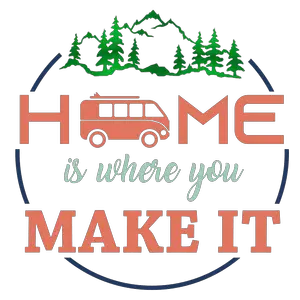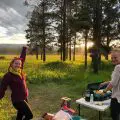Hey! This site is reader-supported and we earn commissions if you purchase products from retailers after clicking on a link from our site.
It’s true, the Coronavirus has become a pandemic outbreak and it very well may become a worldwide epidemic. In this article, I’m going to share some of my thoughts about how I’m dealing with the COVID-19 virus and how I think you should approach it too as a full-time RVer.
This virus has the biggest effect on those with a weakened immune system and people over the age of 60 years old should be aware of that. My father is 85 years old and I worry for his safety. I’m in my fifties and I worry about my safety.
But am I going to change my lifestyle? Absolutely not. However, I am going to take precautions as everyone should do. Washing my hands more frequently and keeping a distance from other people as well as avoiding crowded places.
Editor’s note: For the latest and most credible information, please visit the Center for Disease Control and Prevention.
When I was younger, I enjoyed the clubs and bars, but as I have gotten older, I now try to avoid crowded places just because I don’t enjoy being in crowded areas. In fact, I prefer to avoid shopping in person at many large retail outlets because I have never liked dealing with all the people there at the same time, although I will order from them online for dry goods. For fresh products such as meats, dairy and produce, I prefer to patronize smaller regional grocery suppliers such as Kroger, Winn-Dixie or Publix. There are always less people there and while I may pay a bit more, I prefer the convenience of avoiding larger groups of shoppers and I have always been willing to pay extra for that convenience.
Is this going to affect the full-time RVer?
I’m sure that this will have an impact on everyone regardless of whether they are full-time RVers or not. New Mexico and Florida have announced that they are closing all state parks and many privately owned campgrounds around the country have temporarily closed, so if you are in transit it may be best to call ahead to make sure your destination will be open when you arrive.
The fact that some private campgrounds would shut down during this event seems odd to me. Of the people that could “self-isolate” from others, a full-time RVer has the best advantage. The full-time RVers that can boondock in remote locations for several days should consider doing just that.
For those full-time RVers that are at seasonal campgrounds, you should probably skip the pot-luck dinners, bingo games, and chili cook-offs until the threat of contracting the virus has passed. While these activities are always fun to do, skip them for now and just go for a walk with your dog.
You should also be aware that more and more states or communities are likely to shut down places where crowds congregate. The governor of Florida has just announced that bars and restaurants will be closed as will the beaches where many spring break vacationers visit this time of year for at least the next 30 days. Restaurants, bars, and coffee shops will be shut down to patrons wishing to dine within the establishments. However, a lot of these establishments will still be allowed to serve their customers using pick-up service, a drive through window, or delivery services.
Will I still be allowed to travel?
It’s unlikely entire communities will be quarantined so stringently that it results in a complete ban by those that are RVers traveling through on the local roadways. However, it would be in your best interest to avoid areas that have placed restrictions or limitations based upon person-to-person contact within their jurisdictions. In other words, stay away from known hotspots for the virus and skip areas that may be contaminated.
Frankly, I think the best thing to do is to hunker down and stay where you are for now. Limit your travel and avoid other people when you can.
Relating reading: An updated list of national park closures due to COVID-19 outbreak
Should I stock up on food and supplies?
I think you should have a 4-6-week supply of essential medications, but I’m a little on the fence about stock-piling food. Unless you have an RV with a lot of storage space and a large refrigerator with a freezer, this may be difficult to do for most RVers. Personally, I think the safest thing to do is order most of your dry goods from online sources such as Amazon and Walmart if you at a location where these can be delivered to you. Unfortunately, they are likely to be out-of-stock on many items because of the mass rush of people to purchase two-week supplies of everything they can think of whether they actually need it or not.
I was at a Winn-Dixie a couple of days ago and people were buying everything they could. I saw shopping carts filled with bottled water and gallons of bleach. They were completely out of bread, fresh chicken and other meat products that are normally readily available. Many cleaning supplies, hand sanitizers, and flu medications were not available. They also had limited supplies of canned vegetables and the list goes on and on. I think people are going a little overboard about this and I think it’s ridiculous when you can’t go down to a local or regional grocer and purchase a loaf of bread. In my opinion, if you don’t absolutely need some of the stuff people are buying, don’t buy it.
What can I do to avoid getting the Coronavirus?
The best way to avoid contracting the Coronavirus is to avoid close contact with other people. For now, avoid handshakes, fist bumps, and other personal contact with others, especially if you don’t know them. If you’re a grandparent that only sees your grandchildren occasionally, skip the physical contact with them for now. I know that’s hard for many, but it’s in the best interest for you and the grandchildren.
If you can find hand sanitizer wipes and have them on hand, be sure to use them when you come into contact with doorknobs or shopping cart handles. Consider using hand wipes after using commonly touched items such as keypads on ATM machines, credit card readers and gas pumps.
You should also avoid touching your face. Since this virus is primarily contracted by touching an area (or body part of another), it’s best to limit the contact of your hands to your face especially if you haven’t washed your hands since you’ve been in close proximity to others.
Consider distancing yourself from fellow campers. As I said before, skip the social gatherings at your campgrounds and if you’re boondocking in popular BLM or U.S. national park land, consider putting some distance between you and other rigs for now.
My final thoughts
My friends and fellow travelers, we’re all in this together. Practice safe hygiene by not spreading the virus. Limit your visits to public places such as grocery stores and always make sure to sterilize your hands after you’ve been to public places.
Plan any future trips carefully and if you are expecting to stay at a certain location, contact them to make sure you can stay there for the length of time you booked and longer if necessary.
As always, my friends, I wish you safe and healthy travels. Be safe, be healthy and I can’t wait to meet up with you as we travel some of these journeys together.



